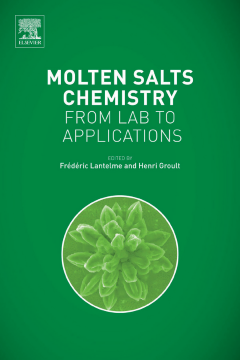
Additional Information
Book Details
Abstract
Molten salts and fused media provide the key properties and the theory of molten salts, as well as aspects of fused salts chemistry, helping you generate new ideas and applications for fused salts. Molten Salts Chemistry: From Lab to Applications examines how the electrical and thermal properties of molten salts, and generally low vapour pressure are well adapted to high temperature chemistry, enabling fast reaction rates. It also explains how their ability to dissolve many inorganic compounds such as oxides, nitrides, carbides and other salts make molten salts ideal as solvents in electrometallurgy, metal coating, treatment of by-products and energy conversion. This book also reviews newer applications of molten salts including materials for energy storage such as carbon nano-particles for efficient super capacitors, high capacity molten salt batteries and for heat transport and storage in solar plants. In addition, owing to their high thermal stability, they are considered as ideal candidates for the development of safer nuclear reactors and for the treatment of nuclear waste, especially to separate actinides from lanthanides by electrorefining.
- Explains the theory and properties of molten salts to help scientists understand these unique liquids
- Provides an ideal introduction to this expanding field
- Illustrated text with key real-life applications of molten salts in synthesis, energy, nuclear, and metal extraction
"Editors Lantelme…and Groult…present this compilation of research on molten salt chemistry and its applications, especially in high-temperature industrial processes. The first few chapters are allocated to modeling, spectroscopy, and thermodynamics of molten salt systems, followed by varied applications. Many chemical families are covered, including halides, carbonate-oxide systems, rare-earths, low-abundance transition metals, lithium compounds, and radioactive heavy elements…"--Reference & Research Book News, December 2013
